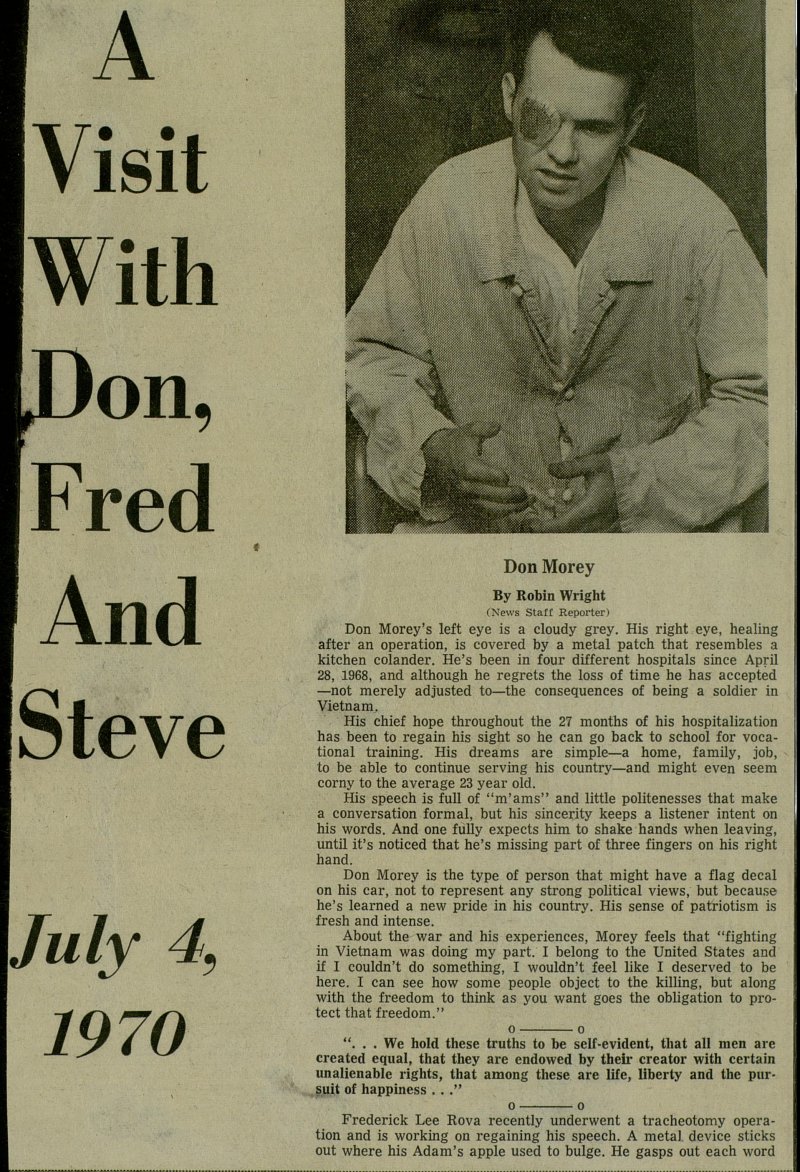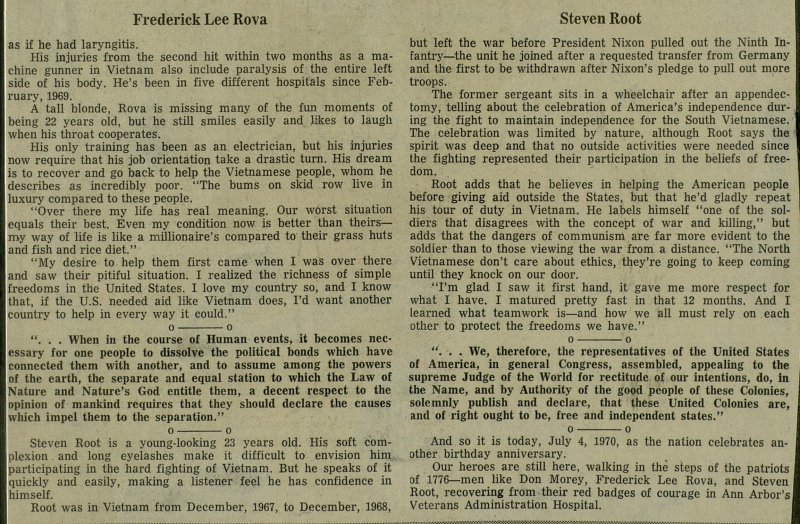A Visit With Don, Fred And Steve


Don Morey's left eye is a cloudy grey. His right eye, healing after an operation, is covered by a metal patch that resembles a kitchen colander. He's been in four different hospitals since April 28, 1968, and although he regrets the loss of time he has accepted - not merely adjusted to- the consequences of being a soldier in Vietnam. His chief hope throughout the 27 months of his hospitalization has been to regain his sight so he can go back to school for vocational training. His dreams are simple - a home, family, job, to be able to continue serving his country- and might even seem corny to the average 23 year old. His speech is full of "m'ams" and little politenesses that make a conversation formal, but his sincerity keeps a listener intent on his words. And one fully expects him to shake hands when leaving, until it's noticed that he's missing part of three fingers on his right hand. Don Morey is the type of person that might have a flag decal on his car, not to represent any strong political views, but because he's learned a new pride in his country. His sense of patriotism is fresh and intense. About the war and his experiences, Morey feels that "fighting in Vietnam was doing my part. I belong to the United States and if I couldn't do something, I wouldn't feel like I deserved to be here. I can see how some people object to the killing, but along with the freedom to think as you want goes the obligation to protect that freedom." o o ". . . We hold these truths to be self-evident, that all men are created equal, that they are endowed by their creator with certain unalienable rights, that among these are life, liberty and the pursuit of happiness . . ." o o Frederick Lee Rova recently underwent a tracheotomy operation and is working on regaining his speech. A meta] device sticks out where his Adam's apple used to bulge. He gasps out each word as if he had laryngitis. His injuries from the second hit within two months as a machine gunner in Vietnam also include paralysis of the entire left side of his body. He's been in five different hospitals since February, 1969. A tall blonde, Rova is missing many of the fun moments of being 22 years oíd, but he still smiles easily and Jikes to laugh when his throat cooperates. His only training has been as an electrician, but his injuries now require that his job orientation take a drastic turn. His dream is to recover and go back to help the Vietnamese people, whom be describes as incredibly poor. "The bums on skid row live in luxury compared to these people. "Over there my life has real meaning. Our worst situation equals their best. Even my condition now is better than theirs - my way of life is like a millionaire's compared to their grass huts and fish and rice diet." "My desire to help them first carne when I was over there and saw their pitiful situation. I realized the richness of simple freedoms in the United States. I love my country so, and I know that, if the U.S. needed aid like Vietnam does, I'd want another country to help in every way it could." o o ". . . When in the course of Human events, it becomes neeessary for one people to dissolve the political bonds which have connected them with another, and to assume among the powers of the earth, the separate and equal station to which the Law of Nature and Nature's God entitle them, a decent respect to the opinión of mankind requires that they should declare the causes which impel them to the separation." o o Steven Root is a young-looking 23 years old. His soft complexion . and long eyelashes make it difficult to envision him participating in the hard fighting of Vietnam. But he speaks of it quickly and easily, making a listener feel he has confidence in himself. Root was in Vietnam from December, 1967, to December, 1968, but left the war before President Nixon pulled out the Ninth Infantry- the unit he joined after a requested transfer from Germany and the first to be withdrawn after Nixon's pledge to pull out more troops. The former sergeant sits in a wheelchair after an appendectomy, telling about the celebration of America's independence during the fight to maintain independence for the South Vietnamese. The celebration was limited by nature, although Root says the spirit was deep and that no outside activities were needed since the fighting represented their participation in the beliefs of freedom. Root adds that he believes in helping the American people before giving aid outside the States, but that he'd gladly repeat his tour of duty in Vietnam. He labels himself "one of the soldiers that disagrees with the concept of war and killing," but adds that the dangers of communism are far more evident to the soldier than to those viewing the war from a distance. "The North Vietnamese don't care about ethics, they're going to keep coming until they knock on our door. "I'm glad I saw it first hand, it gave me more respect for what I have. I matured pretty fast in that 12 months. And I learned what teamwork is - and how we aE must rely on each other to protect the freedoms we have." o o ". . . We, therefore, the representatives of the United States of America, in general Congress, assembled, appealing to the supreme Judge of the World for rectitude of our intentions, do, In the Name, and by Authority of the good people of these Colonies, solemnly publish and declare, that these United Colonies are, and of right ought to be, free and independent states." o o And so it is today, July 4, 1970, as the nation celebrates another birthday anniversary. Our héroes are still here, walking in thé steps of the patriots of 1776 - men like Don Morey, Frederick Lee Rova, and Steven Root, recovering from their red badges of courage in Ann Arbor's Veterans Administration Hospital.